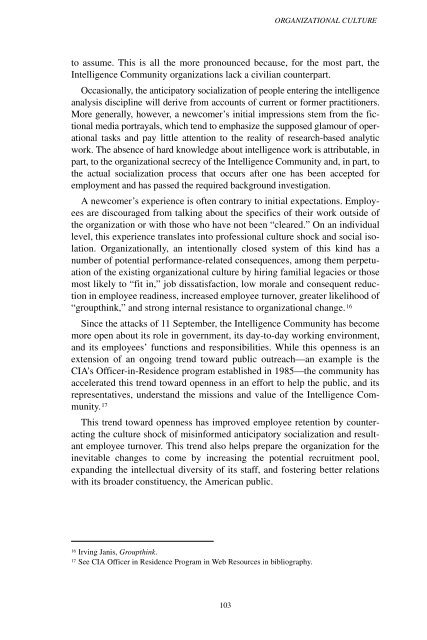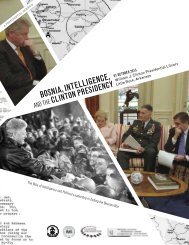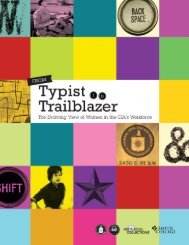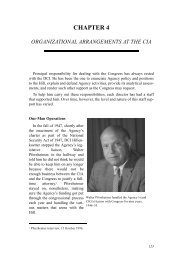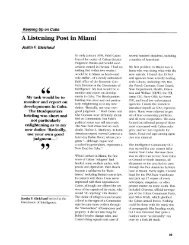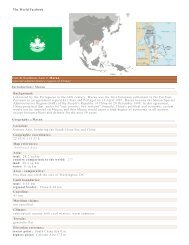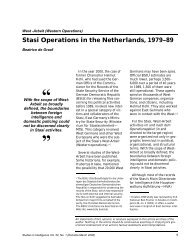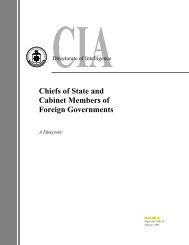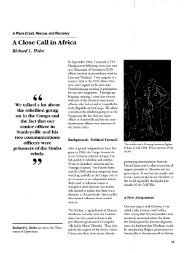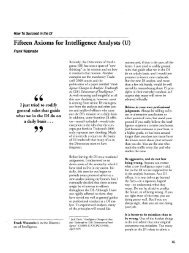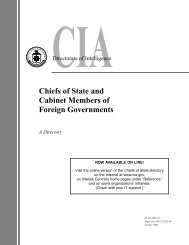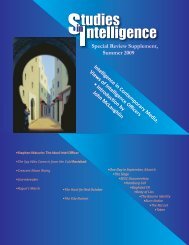Analytic Culture in the U.S. Intelligence Community (PDF) - CIA
Analytic Culture in the U.S. Intelligence Community (PDF) - CIA
Analytic Culture in the U.S. Intelligence Community (PDF) - CIA
You also want an ePaper? Increase the reach of your titles
YUMPU automatically turns print PDFs into web optimized ePapers that Google loves.
ORGANIZATIONAL CULTURE<br />
to assume. This is all <strong>the</strong> more pronounced because, for <strong>the</strong> most part, <strong>the</strong><br />
<strong>Intelligence</strong> <strong>Community</strong> organizations lack a civilian counterpart.<br />
Occasionally, <strong>the</strong> anticipatory socialization of people enter<strong>in</strong>g <strong>the</strong> <strong>in</strong>telligence<br />
analysis discipl<strong>in</strong>e will derive from accounts of current or former practitioners.<br />
More generally, however, a newcomer’s <strong>in</strong>itial impressions stem from <strong>the</strong> fictional<br />
media portrayals, which tend to emphasize <strong>the</strong> supposed glamour of operational<br />
tasks and pay little attention to <strong>the</strong> reality of research-based analytic<br />
work. The absence of hard knowledge about <strong>in</strong>telligence work is attributable, <strong>in</strong><br />
part, to <strong>the</strong> organizational secrecy of <strong>the</strong> <strong>Intelligence</strong> <strong>Community</strong> and, <strong>in</strong> part, to<br />
<strong>the</strong> actual socialization process that occurs after one has been accepted for<br />
employment and has passed <strong>the</strong> required background <strong>in</strong>vestigation.<br />
A newcomer’s experience is often contrary to <strong>in</strong>itial expectations. Employees<br />
are discouraged from talk<strong>in</strong>g about <strong>the</strong> specifics of <strong>the</strong>ir work outside of<br />
<strong>the</strong> organization or with those who have not been “cleared.” On an <strong>in</strong>dividual<br />
level, this experience translates <strong>in</strong>to professional culture shock and social isolation.<br />
Organizationally, an <strong>in</strong>tentionally closed system of this k<strong>in</strong>d has a<br />
number of potential performance-related consequences, among <strong>the</strong>m perpetuation<br />
of <strong>the</strong> exist<strong>in</strong>g organizational culture by hir<strong>in</strong>g familial legacies or those<br />
most likely to “fit <strong>in</strong>,” job dissatisfaction, low morale and consequent reduction<br />
<strong>in</strong> employee read<strong>in</strong>ess, <strong>in</strong>creased employee turnover, greater likelihood of<br />
“groupth<strong>in</strong>k,” and strong <strong>in</strong>ternal resistance to organizational change. 16<br />
S<strong>in</strong>ce <strong>the</strong> attacks of 11 September, <strong>the</strong> <strong>Intelligence</strong> <strong>Community</strong> has become<br />
more open about its role <strong>in</strong> government, its day-to-day work<strong>in</strong>g environment,<br />
and its employees’ functions and responsibilities. While this openness is an<br />
extension of an ongo<strong>in</strong>g trend toward public outreach—an example is <strong>the</strong><br />
<strong>CIA</strong>’s Officer-<strong>in</strong>-Residence program established <strong>in</strong> 1985—<strong>the</strong> community has<br />
accelerated this trend toward openness <strong>in</strong> an effort to help <strong>the</strong> public, and its<br />
representatives, understand <strong>the</strong> missions and value of <strong>the</strong> <strong>Intelligence</strong> <strong>Community</strong>.<br />
17<br />
This trend toward openness has improved employee retention by counteract<strong>in</strong>g<br />
<strong>the</strong> culture shock of mis<strong>in</strong>formed anticipatory socialization and resultant<br />
employee turnover. This trend also helps prepare <strong>the</strong> organization for <strong>the</strong><br />
<strong>in</strong>evitable changes to come by <strong>in</strong>creas<strong>in</strong>g <strong>the</strong> potential recruitment pool,<br />
expand<strong>in</strong>g <strong>the</strong> <strong>in</strong>tellectual diversity of its staff, and foster<strong>in</strong>g better relations<br />
with its broader constituency, <strong>the</strong> American public.<br />
16<br />
Irv<strong>in</strong>g Janis, Groupth<strong>in</strong>k.<br />
17<br />
See <strong>CIA</strong> Officer <strong>in</strong> Residence Program <strong>in</strong> Web Resources <strong>in</strong> bibliography.<br />
103


